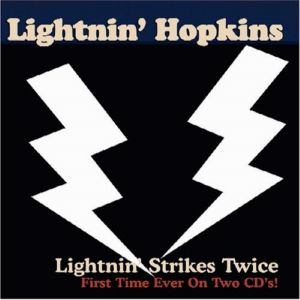
- Format: MP3

Aubrey Mayhew, founder of the maverick country label Little Darlin' Records, sought out taciturn bluesman Sam "Lightnin'" Hopkins in Houston in 1967 and persuaded him to make some casual field recordings for him at nearby Gold Star Studio and, as it turned out, at two small local bars. The results of these extremely loose and casual sessions were issued as a series of five short albums under the blanket title of The Lost Texas Tapes, and it is those five releases that are collected here into one double-disc set. Intimacy is the operative word for these tracks, as Hopkins (playing solo electric guitar) sounds relaxed and at ease, and while these recordings are hardly the place to start with Lightnin', die-hard fans will find them indispensable for the insight they give into his creative process. Hopkins didn't sing songs so much as spontaneously make them up on the spot, pulling events from his daily life and matching them to one of his set blues riffs, and when the process worked, as it does here on cuts like "I Heard My Baby Crying" and "You and Your Man Don't Get Along," the results can be a stunning example of the blues as personal catharsis, and when it failed to click, well, it sounded like any of a dozen other Hopkins songs. Mayhew, who produced these sessions (meaning he paid for them), could never convince Hopkins that he wasn't from New York (he was actually from Nashville), leading to a brief history of their relationship from Hopkins' perspective on the completely improvised "That Man From New York City," one of the highlights on disc one. Nearly half of what is here was recorded at two local bars, and several cuts feature the distinct sound of ringing cash register bells in the background. The end of the second disc is a bit of a shock, as Hopkins invites a couple of his friends up to play, the harmonica player Curley Lee and an Irish folk singer named Irish O'Malley. Lee plays some fine harmonica, and even does a wonderful job singing on "Sorrow to My Heart" (a version of "Careless Love"), but O'Malley's Celtic medley of "Chicka Choca Shalali" and "Blow Out the Candle" is jarringly strange, at least in the context of a Lightnin' Hopkins gig. In spite of the musical intrusions (or maybe because of them), Lightnin' Strikes Twice is a remarkably intimate glimpse of an utterly unique bluesman, catching him close to home in familiar surroundings.